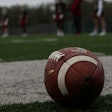All Rights Reserved
For each vehicle that gets a new set of tires, the old ones must go somewhere. Instead of creating a fire hazard by piling them at unsightly dumps, some ground-up tires are used as ground cover at playgrounds and filler on synthetic turf sports fields -- including MetLife Stadium in New Jersey, home to the NFL's New York Giants and Jets and next month's Super Bowl.
Such usage is a win-win and recyling at its best, say those in the industries involved, who also note synthetic turf doesn't require water, fertilizer or pesticides. But there are critics who warn that tire materials contain toxic substances and carcinogens that might pose health risks for athletes and kids.
At the center of the debate are the federal Environmental Protection Agency and a Washington, D.C., non-profit group that represents local, state and federal employees in the environmental field.
"This issue was brought to us by EPA scientists," says Jeff Ruch, executive director of Public Employees for Environmental Responsibility (PEER). "They were sort of appalled with what the agency was doing.
"You've got the solid waste people saying, 'Look, if it's recycled, it's good, so we're solving an environmental problem by taking tires out of the landfill.' And the scientists are saying, 'Gee, is that a good idea? What about the people that are exposed to it?'"
Ground-up tires -- crumb rubber in the lingo of the industry -- can be processed into black granules that resemble sesame seeds and used with sand as "infill" under the turf fibers.
MetLife Stadium went with a new synthetic turf field last summer. The Speed Series S5-M surface, made by UBU Sports of Dalton, Ga., uses sand and crumb rubber infill and, the company says, "ensures a fast, firm and safe playing field." It's the same turf used at last year's Super Bowl at the Mercedes-Benz Superdome in New Orleans.
Brian McCarthy, NFL vice president of corporate communications, expressed no reservations about the turf or tire particles.
"It's our understanding that someone would have to eat the turf or be run over by a tire to be injured. ... There's no concern," McCarthy told USA TODAY Sports.
MetLife previously had FieldTurf, which used ground tires. "Time for a new surface after three full years," McCarthy says. "Keep in mind they have two NFL teams there, concerts, soccer, monster truck events, etc."
UBU Sports says 200 tons of crumb rubber infill were used: "That saves 36,504 tires from landfills, which is enough for 9,126 cars."
Nick Vlcek, a spokesman for UBU Sports, says of the health concerns: "I do know that the EPA released a statement a few years ago ... that crumb rubber is safe."
In a 2009 study by the EPA, the agency said in a news release limited field monitoring found a "low level of concern." The study and release remain on the EPA website.
But last month, after a request by PEER that it rescind both, the EPA added a notification to the original 2009 release on its website: "This news release is outdated. Visit the EPA Tire Crumb Study Web Page for the most current information."
The section of the Tire Crumb Study Web Page addressing the study says, "Given the very limited nature of this study ... and the wide diversity of tire crumb material, it is not possible ... to reach any more comprehensive conclusions without the consideration of additional data."
The web page lists 30 compounds or materials that might be found in tires, from acetone to trichloroethylene. One line the EPA dropped from the original web page: "On average the concentrations of components monitored in this study were below levels of concern."
But according to PEER, "Many of these chemicals are carcinogens and can have a negative effect on humans' nervous systems, reproductive systems, dermal (skin) systems, ocular (eye) systems or immune systems."
In August, the Rubber Manufacturers Association released a review of studies of crumb tires, prepared by the Pittsburgh division of Cardno ChemRisk. It found "no adverse ... health effects" were likely to result from the beneficial reuses of tire materials but acknowledged that additional research would be helpful.
Nancy Alderman, president of Environment and Human Health, Inc., a non-profit based in New Haven, Conn., says her group has campaigned for years about the "toxicity of rubber tires." She says, "There are certain things that shouldn't be recycled: asbestos, lead and ground-up rubber tires. I mean, these are hazardous commodities."
Terms and Conditions Privacy Policy



































